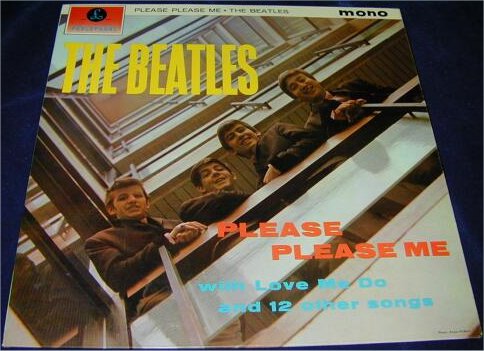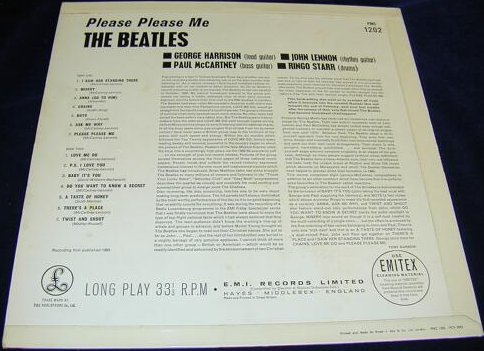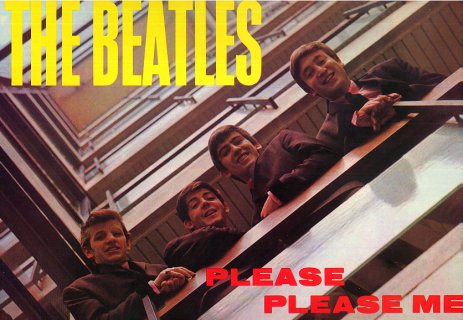

 |
 |
| Please Please Me - Front Cover | Please Please Me - Back Cover |
 |
| Please Please Me - Front Cover (Detail) |
| Label | Parlophone | ||||||||||||||||||||
| Catalogue No.'s | PMC 1202 (Mono) PCS 3042 (Stereo) CDP 7 46435 2 (C.D.) |
||||||||||||||||||||
| Matrix No.'s |
|
||||||||||||||||||||
| Release dates | 22nd March 1963 (Mono ONLY) 26th April 1963 (Stereo version) 26th February 1987 (CD release) |
||||||||||||||||||||
| Total time | 31:59 | ||||||||||||||||||||
| U.K. Album Chart Detail : |
| ||||||||||||||||||||
| Detail : | The Beatles FIRST official L.P. release For the ONLY time, the mono version was issued 6 weeks BEFORE the stereo version. This album contained the "A" and "B" sides of their first two singles, plus 10 new songs ALL recorded in one incredible session at Abbey Road. The session cost just £400 and lasted 16 hours. Just imagine being there. The album took exactly 6 months to pass the sales figure of 250,000, and went on to sell over half-a-million in the U.K. with world sales of almost two million. It still holds the record for the longest continuous stay at number 1
The cover photo was taken at EMI's former headquarters at Manchester Sq. by Angus McBean on 5th March 1963. "Misery" was written by Lennon/McCartney for Helen Shapiro. When she turned it down, Kenny Kynch recorded it and became the first artist to cover a Lennon/McCartney song. In America this album was released under the title, "Introducing The Beatles" on 22nd July 1963, but had two tracks missing. "Please Please Me" and "Ask Me Why" were omitted ... BUT ... when the album was re-released on 27th January 1964 those tracks were included ... BUT ... "Love Me Do" and "P.S. I Love You" were left off ! The album was also part of "The Beatles Collection" 13 album box set (see Beatles Collection).
On 26th February 1987 this album had it's first release on C.D. which was published in Mono(!) with a catalogue number of
CDP 7 46435 2
The C.D. was also part of "The Beatles Box" 15 C.D. box set (see Beatles C.D. Box).
09/09/09 (Number Nine, Number Nine, Number Nine) - the album was re-released as part of the Beatles In Stereo Remasters collection.
Digital Downloads
Tape Media
Prior to 1973: In November 1987 the album was again released on cassette tape (mono only !) - Catalogue number - TC-PMC 1202.
|
| Track | Composer | Recording Date and Information | Time |
| I Saw Her Standing There | McCartney-Lennon | 11th February 1963 in 12 takes Final mix - takes 9 and 12. |
2:52 |
| Misery | McCartney-Lennon | 11th February 1963 in 11 takes (The early takes are still amongst my favourite outtakes) Overdubs 20th February 1963 creating takes 12-16 Final mix - take 16. |
1:47 |
| Anna (Go To Him) | Alexander | 11th February 1963 in 3 takes Final mix - take 3. |
2:54 |
| Chains | Goffin-King | 11th February 1963 in 4 takes Final mix - take 1. |
2:23 |
| Boys | Dixon-Farrell | 11th February 1963 in just 1 take Final mix - take 1. |
2:24 |
| Ask Me Why | McCartney-Lennon | 26th November 1962 in 6 takes Final mix - take 6. |
2:24 |
| Please Please Me | McCartney-Lennon | 26th November 1962 in 18 takes (A slower version was recorded 11th September 1962, but erased) Final mix - mono was one single take, whereas stereo was takes 16/17/18 edited. |
2:00 |
| Track | Composer | Recording Information | Time |
| Love Me Do | McCartney-Lennon | 11th September 1962 in 18 takes, with Andy White on drums (The version with Ringo was 1 week earlier on the 4th) Final mix - take 18. |
2:19 |
| P.S. I Love You | McCartney-Lennon | 11th September 1962 in 10 takes, with Andy White on drums, and Ringo on Maracas Final mix - take 10. |
2:02 |
| Baby It's You | David-Williams-Bacharach | 11th February 1963 in 3 takes Overdubs 20th February 1963 creating takes 4-6 Final mix - take 5. |
2:35 |
| Do You Want To Know A Secret | McCartney-Lennon | 11th February 1963 in 8 takes Final mix - take 8. |
1:56 |
| A Taste Of Honey | Scott-Marlow | 11th February 1963 in 7 takes Final mix - take 7. |
2:01 |
| There's A Place | McCartney-Lennon | 11th February 1963 in 13 takes Final mix - take 13. |
1:49 |
| Twist And Shout | Medley-Russell | 11th February 1963 in 2 takes (A second take was attempted, but it is Take 1, raw and complete, on record) Final mix - take 1. |
2:33 |
| "Please Please Me" | The stereo version has John making a mistake in the words of the final verse. John sings "I know I never even try girl" instead of "I know you never even try girl" ... which causes him to chuckle briefly in the final chorus ... these are NOT heard in the mono version. |
The soon to be replaced gold lettering on black "Parlophone" label is by far the rarest, with the Mono version worth about £250 and the stereo version five times that !Second Pressings (1963)
These first pressings had the six new McCartney/Lennon songs with a publishing credit of "Dick James Music Co.", and the cover was a laminated sleeve with a polythene lined inner sleeve with an advert for "Emitex" cleaning cloths upon them.
Example label - First Pressing (Mono) Example label - A-side First Pressing (Stereo) Example label - B-side First Pressing (Stereo)
Exactly the same as the above, but the publishing credit had changed to "Northern Songs". These gold/black pressings are equally as valuable as above.Third Pressings (1963)
But in saying that, I am led to believe that after the changeover to the Northern Songs credit and before the lettering change as identified in the next pressing, there were fewer of these pressed than the first pressing. I am informed that only 900 were issued.
Example label - A-side Second Pressing (Mono) Example label - B-side Second Pressing (Mono) Example label - A-side Second Pressing (Stereo) Example label - B-side Second Pressing (Stereo)
The gold lettering is now replaced with a more typical yellow block writing.Fourth Pressings (1963)
The "All rights of the manufacturer" message around the edge of the label starts with "The Parlophone Co. Ltd."
The label does NOT have "Recording first published 1963" or "Sold in the U.K..." statements.
The word "mono" (or stereo) on the front cover is larger than in later editions.
The standard yellow block writing Parlophone label.Fifth Pressings (1965)
The "All rights of the manufacturer" message around the edge of the label starts with "The Parlophone Co. Ltd."
The label DOES have "Recording first published 1963", but NOT "Sold in the U.K..." statements.
The word "mono" (or stereo) on the front cover is larger than in later editions.
The standard yellow block writing Parlophone label.Sixth Pressings (1969)
The "All rights of the manufacturer" message around the edge of the label now starts with "The Gramophone Co. Ltd."
The label DOES have "Sold in the U.K..." statement.
The word "mono" (or stereo) on the front cover is smaller.
The standard yellow block writing Parlophone label.Seventh Pressings (1969)
The "All rights of the manufacturer" message around the edge of the label starts with "The Gramophone Co. Ltd."
The label does NOT have "Sold in the U.K..." statement.
The word "mono" (or stereo) on the front cover is smaller.
Now with a silver/black Parlophone label.Eighth Pressings (1973) - Stereo version ONLY
The "All rights of the manufacturer" message around the edge of the label now starts with "EMI Records Ltd."
The label has one EMI boxed logo.
Silver/black Parlophone label.Ninth Pressings (1982) - Mono version ONLY
The "All rights of the manufacturer" message around the edge of the label now starts with "EMI Records Ltd."
The label has TWO EMI boxed logos as can be seen below ...
Example 8th Pressing label, showing two EMI boxed logo's
Now with a yellow/black Parlophone label.Tenth Pressings (1995) - Mono version ONLY
The "All rights of the manufacturer" message around the edge of the label now starts with "EMI Records Ltd."
This release is on a lightweight vinyl.
Now with a Black and Silver Parlophone label.
The sleeve has a printed statement which reads:
"This album has been Direct Metal Mastered From a Digitally Re-mastered Original Tape to give the best possible sound quality"
This release is (surprisingly) on a lightweight vinyl.